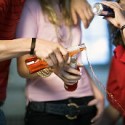For Young Adults Addicted To Opioids, New Training Approach Launched By NIDA Blending Conference
A multi-faceted treatment program for young adults addicted to opioid drugs was unveiled at the National Institute on Drug Abuse’s (NIDA) Blending Conference in Albuquerque, N.M. This eighth meeting in the series briought together researchers and clinicians so their latest findings could be immediately applied to the needs of patients and their families dealing with addictive disorders. NIDA is a component of the National Institutes of Health.
The new treatment product, Buprenorphine Treatment for Young Adults, was based on research by NIDA’s Clinical Trials Network in partnership with the Substance Abuse and Mental Health Services Administration (SAMHSA). It showed that young adults given longer term treatment with the medication buprenorphine were less likely to use drugs and more likely to stay in treatment, compared to those who received short term detoxification without follow-up medication. Buprenorphine helps relieve drug cravings.
“Buprenorphine had been proven effective with adults, but until recently, evidence was lacking that its anti-addiction properties would work in this important group of younger patients,” said NIDA Director Dr. Nora Volkow. “The new product includes a three-hour training package that examines opioid use among young adults and looks at research results showing the effectiveness of buprenorphine for this age group.”
The training program is in a suite of buprenorphine products developed by the Blending Initiative. Among them: training for addiction professionals about laws governing the office-based use of the treatment; a discussion of how to select appropriate patients; and an explanation of how buprenorphine works. Yet another product outlines the results of a NIDA clinical trial comparing short-term detoxification with buprenorphine versus clonidine, another addiction treatment.
This spring’s conference was titled “Blending Addiction Science and Practice: Evidence-Based Treatment and Prevention in Diverse Populations and Settings.” In addition to the new buprenorphine products, the topics ranged from controlling heroin and opioid addiction in young adults to understanding genetic changes in the brain that underlie addiction.
“Rapid advances in our understanding of the mechanisms behind addiction have expanded our treatment horizon dramatically in recent years,” said Dr. Volkow. “The value of the Blending Conference is that it provides an opportunity to translate basic research knowledge into everyday clinical practice.”
The Albuquerque conference is the biggest Blending meeting to date, with more than 1,300 registrants. Those attending included leading addiction treatment specialists, health care providers, criminal justice professionals, researchers and policymakers.
Other sessions included:
- Developing new drug addiction treatments: Dr. Volkow highlighted the dramatic scientific advances that help explain the molecular and genetic changes that underlie addiction.
- Vaccines for treating nicotine and cocaine addiction: Could the immune system be exploited to help smokers quit or cocaine users from relapsing? The idea is that by evoking an immune/antibody response to nicotine, we could keep it out of the brain, blocking its rewarding effects and promoting abstinence. A similar approach is being used with cocaine. Clinical trials are underway.
- A special track addressing American Indian and Alaskan Natives: These populations have long endured historical trauma and discrimination that have contributed to negative health outcomes, including substance abuse and HIV infection. Presenters will discuss how a culturally appropriate treatment framework based on input from the Native American community can respond to these complex health issues.
- Veterans with post traumatic stress disorder (PTSD): In the aftermath of combat stress, soldiers can develop mental health and substance abuse problems which can spill over into the family environment with destructive consequences. Addiction scientists will discuss the complex effects of combat-related PTSD on veterans, reservists and their families.
Source:
NIDA Press Office
NIH/National Institute on Drug Abuse
